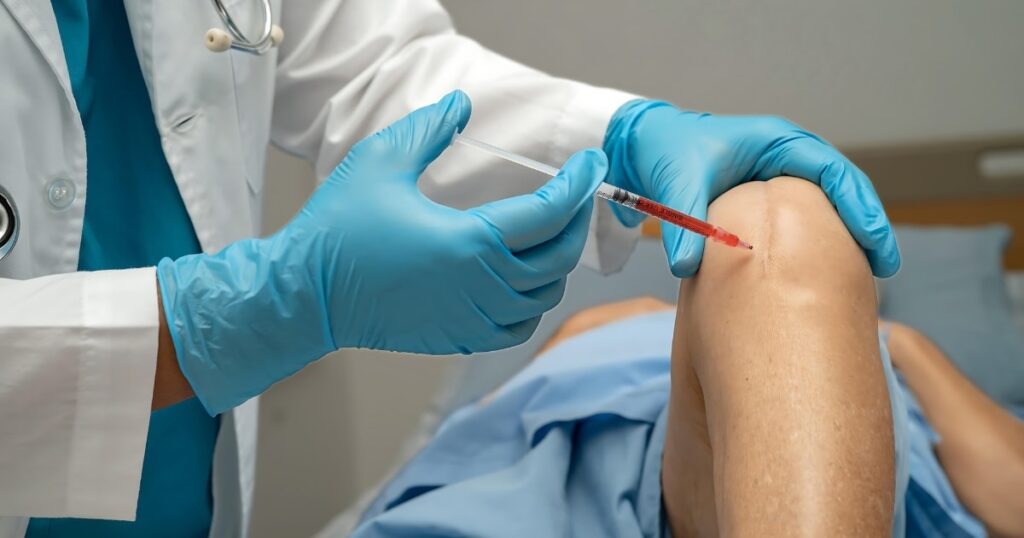
Knee pain affects millions of people worldwide. From athletes to the elderly, knee problems can severely impact the quality of life. Traditional treatments like medication and physical therapy, often give only temporary relief. More invasive solutions, like knee replacement surgery, come with high risks and a lengthy recovery period. However, at Stem Cells LA we’re using a revolutionary alternative in the medical community: stem cell therapy for knee injections.
Stem cell therapy for knees focuses on recovery, regeneration, and healing, offering hope to those suffering from chronic knee pain and arthritic joints. Compared to knee replacement surgery, stem cell treatment has a higher success rate and fewer risks, making it a beneficial option for knee pain and repair.
Understanding Knee Issues

Common Knee Issues
The knee as unnoticed as it can be, typically in our younger years, is a bit more complex than just a hinge type joint. The knee joint is surrounded by various soft tissues, including ligaments, tendons, cartilage and the synovial membrane, which produces synovial fluid to “lubricate the knee joints.” For better insight, cartilage is a flexible, rubbery tissue that cushions the knee joint and enables smooth movement.
When any of these are worn down, torn or deteriorated, it can cause an immense amount of pain because your knees need all of these to function well.
Symptoms of Knee Issues
Knee issues can arise from various causes, including injuries, overuse, and degenerative diseases like arthritis.
Depending on the underlying cause, such as torn ligaments or tendons, worn or deteriorated cartilage, and problems with the synovial membrane or fluid, knee issues can present themselves in numerous ways.
Torn ligaments or tendons typically lead to severe, immediate pain, rapid swelling, and noticeable bruising around the knee. Patients often feel instability, with the knee giving way or buckling during weight-bearing activities. Reduced range of motion is common, making it challenging to fully bend or straighten the knee, often accompanied by a popping or snapping sound.
Worn or deteriorated cartilage, often due to conditions like the knee osteoarthritis, results in chronic pain that worsens with activity and improves with rest. Stiffness is frequent in the morning or after inactivity. With reduced/near non–existent cartilage, bone-on-bone contact can be felt as a grinding sensation during movement. Issues with the synovial membrane or fluid can lead to additional swelling and discomfort, further restricting knee function and mobility. These symptoms shoe just how important it is for early diagnosis and treatment to prevent further deterioration.
Traditional Treatments for Knee Issues
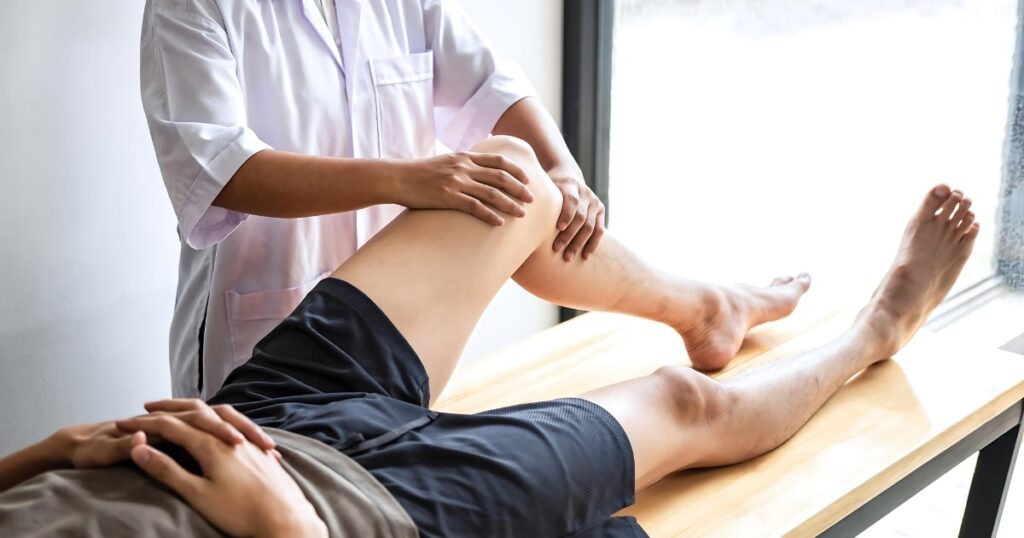
Physical Therapy
Physical therapy has been a cornerstone of non-invasive treatment for knee issues for years, aiming to improve strength, flexibility, and mobility through targeted exercises and modalities. It focuses on rehabilitating the knee joint and surrounding muscles, ligaments, and tendons to enhance overall function and reduce pain.
While physical therapy can yield significant benefits, such as improved range of motion and reduced pain, it typically requires consistency and dedication over an extended period to achieve lasting results. However, its effectiveness may vary depending on the severity of the knee issue and individual response to treatment. In some cases, physical therapy alone may not fully address underlying structural issues like torn ligaments, deteriorated cartilage, or chronic conditions such as osteoarthritis.
Medication
Medications such as Ibuprofen and naproxen are meant to reduce inflammation, in this case inflammation in the knees.
However, while they may be effective in providing short-term relief, especially during flare-ups of conditions like osteoarthritis or tendonitis, anti-inflammatory drugs do come with potential side effects such as gastrointestinal issues such as stomach ulcers and bleeding, even cardiovascular risks. Long-term use of NSAIDs may also affect kidney function.
Knee Replacement Surgery
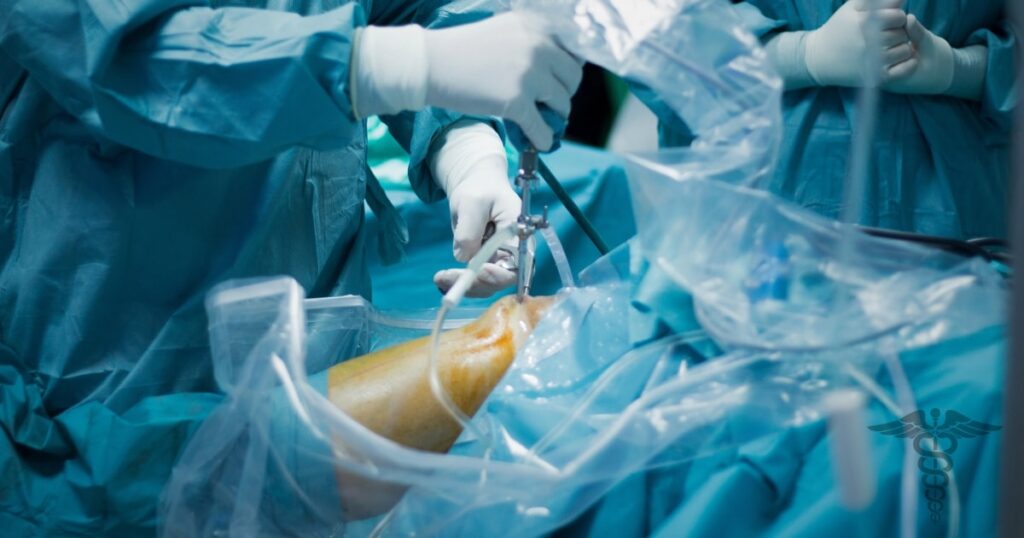
Knee replacement surgery is aimed towards addressing severe knee issues by replacing damaged parts of the knee joint with artificial implants. It is typically the only option recommended for individuals with advanced osteoarthritis, severe joint damage, or even limited mobility due to chronic knee conditions. Autologous stem cell therapy offers a non-invasive and ethical alternative to knee replacement surgery for patients suffering from arthritis.
During the surgery, the surgeon removes the damaged cartilage and bone from the knee joint and replaces it with prosthetic components made of metal, plastic, or a combination of materials. This artificial joint mimics the function of a natural knee, allowing for improved stability, mobility, and pain relief.
Knee replacement surgery can be beneficial, by reducing pain and restoring the knees function. But, it’s important to understand that it’s a major procedure with potential risks such as infection, blood clots, and implant failure and a recovery process that takes time. Patients who undergo knee replacement surgery usually need several weeks to months of rehabilitation and physical therapy to rebuild strength, flexibility, and regain full range of motion in the knees.
Comparing Costs: Stem Cell Therapy vs. Knee Replacement Surgery
So, how much does knee stem cell therapy cost? How much does total knee replacement and surgery cost? Why should you know this?
In today’s day and age its completely normal to wonder the cost comparision of anything, from cartons of eggs to what branded cereal, generic vs name brand… So, naturally of course when it comes to our bodies we’re going to wonder how much a surgery or its alternate is going to cost.
Many patients often wonder about the financial aspects of stem cell therapy versus knee replacement surgery. Stem cell therapy offers a compelling alternative with its ability to address multiple joints in one session. On average, the cost of stem cell therapy for knees is significantly lower—around one-third of the cost of most knee replacement surgeries.
The Promise of Stem Cell Instead of Knee Replacement Surgery
Stem cell therapy stands out for its versatility, allowing even simultaneous treatment of joints like knees, hips, or wrists during a single visit. This efficiency not only reduces treatment costs but also emphasizes on the convenience for patients needing full joint replacement care.
Autologous stem cells, which are adult stem cells harvested from the patient’s own bone marrow, have the natural ability to modulate inflammation, stabilize articular cartilage, and promote regeneration in arthritic joints.
On the opposite end, we have knee replacement surgery, which comes with a large financial commitment, typically averaging about $35,000+ before insurance coverage.
It’s important to note that the actual out-of-pocket cost for stem cell therapy can vary widely based on factors such as insurance coverage details, location, and healthcare provider policies. This cost estimate typically covers the procedure itself and may not include additional follow-up visits or necessary physical therapy sessions.
If that’s not enough to convince you, it can focus solely on knee treatment without spreading itself thin to other joints. And, although most insurance plans as of today don’t cover stem cell therapy; stem cell therapy can still be a cheaper alternate to surgery, and the procedure and recovery time is significantly reduced.
For those looking to avoid the risks and lengthy recovery associated with knee replacement surgery, stem cell therapy provides a compelling alternative. By harnessing the body’s natural healing capabilities, this treatment can address the root cause of knee pain without the need for major surgery.
Stem Cell Therapy for Knee Replacement: Post-Surgical Recovery
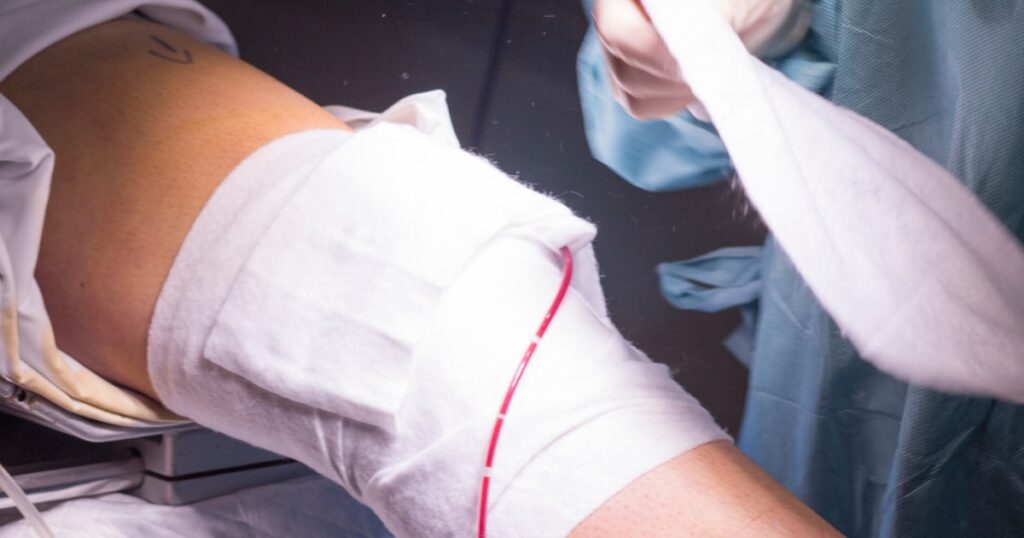
Supporting Healing
For individuals recovering from knee surgery, such as knee replacement, stem cell therapy offers a valuable adjunct to aid in faster recovery. By injecting stem cells directly into the surgical site, this therapy accelerates the healing process. Stem cells promote tissue regeneration and repair, potentially enhancing the outcomes of knee surgery by reducing recovery time and improving overall joint function.
Reducing Inflammation
Post-surgical inflammation is a common challenge that can prolong recovery and cause discomfort. Stem cell injections have shown promise in mitigating inflammation within the knee joint. By modulating the immune response and releasing anti-inflammatory factors, stem cells help to alleviate swelling and pain. This reduction in inflammation not only supports faster healing but also enhances patient comfort during the recovery period, facilitating a smoother rehabilitation process.
Enhancing Recovery
The combination of stem cell therapy with traditional surgical approaches like knee replacement underscores a comprehensive approach to joint health. Beyond addressing immediate post-operative concerns, such as inflammation and tissue healing, stem cell therapy supports long-term joint function and mobility. Patients undergoing this combined treatment approach may experience improved range of motion, reduced stiffness, and enhanced overall recovery outcomes compared to surgery alone.
Incorporating adult stem cells and cell therapy into post-surgical recovery plans for knee replacement represents a promising advancement in orthopedic care. By harnessing the regenerative potential of stem cells, healthcare providers aim to optimize patient outcomes, shorten recovery times, and ultimately improve quality of life for individuals recovering from knee surgery.
The Procedure: Knee Injections with Stem Cells
Preparing for the Procedure
Before undergoing stem cell therapy, patients undergo a comprehensive evaluation to determine if they are good candidates for the treatment. Some clinics utilize imaging studies, such as X-rays or MRI scans, a detailed medical history, and even look at your age to evaluate factors to see If you’re eligible for stem cell therapy for knee injuries.
The Injection Process
In some clinics, stem cells are harvested from the patient’s own body, often from bone marrow or adipose tissue, where they are collected from fatty deposits around the waist, separated from the fat cells, and then processed for injection into the knee joint to aid in healing and tissue regeneration. The stem cells are then processed (separated in a centrifuge) and concentrated before being injected directly into the knee joint. The entire process is minimally invasive and can be completed in an outpatient setting. A good stem cells doctor will often discuss stem cell therapy with patients, explaining its benefits such as modulating inflammation, stabilizing articular cartilage, and promoting regeneration in arthritic joints, in a way to give you a better understanding of what you are getting in to.
Like it was mentioned, some clinics also use a process that involves harvesting adult stem cells from the patient’s bone marrow following with the centrifuge process and then and injecting. At SCLA we typically go a different route. We typically use ethically harvested donor stem cells as opposed to the patients own stem cells. Other than that we keep the procedure just the same, which keeps the whole process as a minimally invasive alternative and the recovery time even shorter.
As more research is being done, stem cell therapy is becoming one of the strongest alternatives in the medical field.
Recovery and Results
After receiving stem cell injections, patients are encouraged to follow a personalized post-injection care plan designed to support optimal healing and recovery. This plan typically involves giving the treated knee adequate rest, allowing the stem cells to effectively integrate and initiate their regenerative process and promote healing itself.
Physical therapy sessions are also recommended to help strengthen the muscles surrounding the knee, improve flexibility, and restore normal range of motion. During this recovery period, it’s crucial for patients to avoid strenuous activities that could potentially disrupt the healing process and compromise treatment outcomes.
Expected Outcomes
Many patients experience significant pain relief and notice improved mobility within the first few months following stem cell therapy. The natural regenerative properties of stem cells often lead to long-term benefits, including enhanced joint function and reduced inflammation.For anyone dealing with conditions like osteoarthritis (arthritic joint) or ligament injuries, this is a very promising alternative to traditional treatments and invasive surgeries.
By harnessing the body’s natural ability, stem cell treatment helps with knee repair and cartilage regeneration, repairs damaged tissue into healthy tissue, supports existing healthy tissue, alleviates pain, and overall just provides hope for restoring quality of life and enabling patients to get back to the life they enjoy, free from the limitations caused by any chronic knee issues.
Stem Cell Therapy for Knee Health at Stem Cells LA
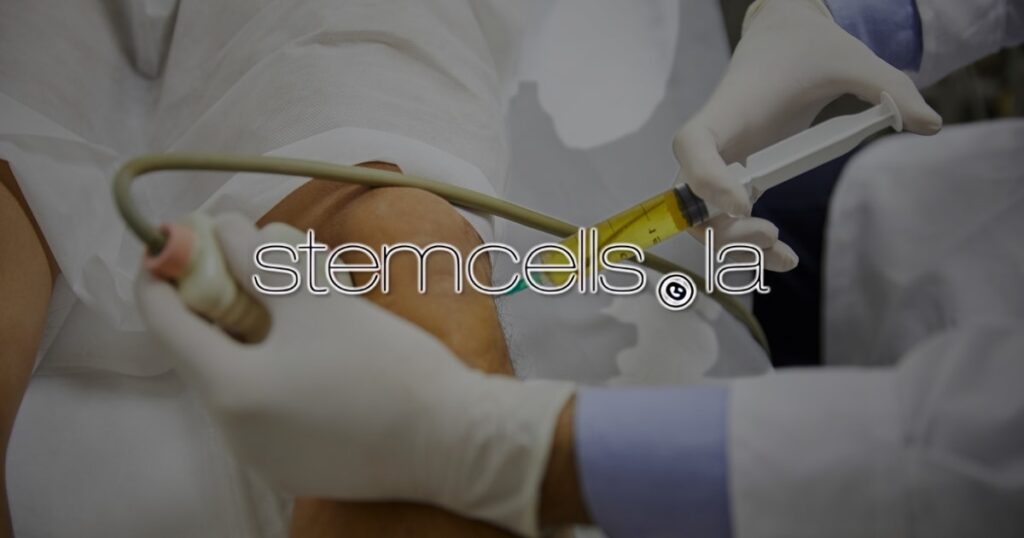
Dealing with knee issues that hold you back from enjoying life to the fullest? Stem Cells LA offers advanced stem cell therapy designed to tackle knee injuries and chronic conditions effectively. Whether you’re an athlete aiming to get back in the game or someone seeking relief from knee pain, our treatments can speed up your recovery, reduce inflamed joints and tissue, and naturally improve your knee health.
At Stem Cells LA, we focus on personalized care using the latest technology to achieve outstanding results. Our team is committed to your well-being, helping you regain mobility and live without knee pain.
Ready to take the next step? Schedule a consultation with us today. During your visit, we’ll assess your condition and discuss how stem cell therapy can rejuvenate your knees. Discover how our approach can empower you to enjoy daily activities pain-free, whether you’re an athlete or looking to improve joint function.
Contact us now to book your consultation and work towards to healthier knees and a better feel on life.
Contact Information:
📞 Call: 310-281-6160
📍 Visit Us: 1970 S. Prospect Ave. Suite 2 Redondo Beach, CA 90277
Experience the difference with Stem Cells LA and regain your knee health today.
Stem cell therapy represents a cutting-edge alternative to knee replacement surgery, offering numerous benefits such as reduced inflammation, faster recovery times, and long-term pain relief. By harnessing the body’s natural healing capabilities, stem cell injections provide a promising option for those suffering from knee issues, whether due to injury, arthritis, or post-surgical recovery.
Ethical considerations associated with embryonic stem cells have led to a preference for adult stem cells, which are often harvested directly from the patient’s body, providing a safe and non-invasive alternative. As research continues to advance, we are able to utilize ethically sourced donor stem cells and pave the way for the future of regenerative medicine, offering hope to millions seeking relief from chronic knee pain and other debilitating conditions.


